Dashnor Kaloçi
Memorie.al publishes an unknown archival document extracted from a voluminous file with the “secret” logo of the Central State Archive in Tirana (the fund of the former Central Committee of the ALP), which belongs to 1973, where a report is located -information of the Party Committee of Gjirokastra district addressed to the Central Committee of the ALP on the topic “On foreign bourgeois-revisionist influences in the field of culture and art and literary and artistic creativity”, which was seen by Ramiz Alia, who has also put the relevant notes. All the activity of actors, painters, musicians, writers and artists of Gjirokastra district, such as: Viktor Zhusti, Bashkim Ahmeti, Bekim Harxhi, Fotaq Malo, Pano Çuka, Roland Çene, Dhimo Dhima, Naxhi Kasaruho, Baftjar Çene, Petro Çerkezi, Sefer Pasho, Niko Dhosko, Valentina Mosko, etc., who were accused by the District Party Committee of “foreign liberal performances and modernist influences”, in their work, creativity and works.
As we have seen in most of the chapters of this book, after the speech given by Enver Hoxha in the apparatus of the Central Committee of the ALP and the Presidium of the People’s Assembly of Albania on March 15 and 16, 1973, where as the main topic was: “foreign and liberal performances in art and culture and their impact on the life of the country”, a word which came only a short time after he had criticized and initially hit the 11th National Radio-Television Song Festival that had just ended in January of that year, in all the cultural and artistic institutions of the capital as well as those of the districts, numerous meetings of the basic organizations of the party and professional committees began. In those meetings that took place “in the spirit of the word of Comrade Enver” and where there were delegates from the Central Committee of the ALP or the committees of the district party, numerous analyzes were discussed and made, with criticism and self-criticism about the work, works and all activities that had taken place up to that time. For the conclusions of these meetings, reports and information were drafted by the Party Committees of the respective districts, which were then sent to the Central Committee of the ALP. One of these is that of the Gjirokastra Party Committee, which we are publishing in this part of the book, which was sent to Ramiz Alia, where he talks about “foreign liberal performances and modernist influences”, in the work, activity and works of writers , artists, actors, painters and musicians from Gjirokastra, such as: actor Viktor Zhusti, painter Bashkim Ahmeti, writers Koço Kosta, Bekim Harxhi, Pano Çuka and Fotaq Malo, musician Roland Çene, as well as actors, directors and artists Dhimo Dhima, Naxhi Kasaruho, Baftjar Çene, Petro Çerkezi, Sefer Pasho, Niko Dhoska, Valentina Mosko, etc. Furthermore, the document in question informs us that, like most of the documents in this book, it is published in full and without any changes.
Report of the Gjirokastra District Party Committee for the Central Committee
R A P O R T
ON SOME CURRENT PROBLEMS IN THE PARTY WORK FOR
STRENGTHENING IDEOLOGICAL CONTENT AND RISE
LEVEL OF QUALITY IN THE FIELD OF CULTURE AND ARTS
The recent speeches of Comrade Enver Hoxha are an extraordinary help for all employees and for employees of culture and arts.
In the spirit of these speeches, deeply understanding the responsibility of these people working on this front, they have been organized under the leadership of the Party in extensive discussions and debates. In them, the developed work has been seen with a critical and self-critical eye, especially foreign influences, the manifestations of which have appeared in the field of literary and artistic creativity, in our scenes on different occasions, in cultural activities and in some walks of life. social ethical-moral.
Following the orders of the Party Committee, our cultural institutions continue to study even more deeply these important materials to further reflect on their activity.
People of art and culture have eagerly awaited these great lessons of Comrade Enver, being seriously committed to strongly fighting these influences and reacting concretely in practical activity.
Being always under the leadership and control of the party, in general, our cultural and artistic institutions have worked to make the activity in this field characterized by a sound ideological content and with a good artistic level.
Priority has been given to massive activities such as concerts of ensembles of the House of Culture and pioneers, schools, work centers, some agricultural cooperatives, etc.
The artistic program given on the occasion of the 30th anniversary of the high school strike, the meetings of high school ensembles, the Military Folk Song Festival, the program for the 60th anniversary of the Declaration of Independence and a number of other performances by professional and amateurs, are described by the revolutionary and militant spirit therefore and have created strong political emotions in the participants and spectators themselves.
Also during this year serious work has been done for the preparation of the National Folklore Festival, consultations have been held with rhapsodists and singers, instrumentalists, folklore expeditions with musicians, writers and painters, political-musical-literary variety competition against foreign influences, concert in the solemn evening the occasion of the 30th anniversary of the Security Weapon, for March 7, March 8, etc., etc.
Without expressing any complacency, but it is a fact that the folk festivals of the villages, work centers, schools, took place at a high artistic level, with a mass that has never been achieved in our district, which is a sound guarantee for it. achieved complete success both in the district and in the national one.
For the first time in our district was organized the scientific session on the problems of art and culture, which was prepared with great seriousness and which had a very positive evaluation by the envoys of central institutions.
Of course, the Party and Comrade Enver teach us never to be satisfied with the results we achieve, but on the basis of their and the straight line of the Party to criticize the shortcomings, weaknesses, to analyze objectively and critically the work done, our activity , put their finger on the wound, exposing the causes and flaws and setting tasks for the future.
One of the gaps in our work is that we have not developed at the right height the fight against foreign influences, however they may be, against bourgeois and revisionist appearances, neglecting in some cases this fight, because we have minimized the vulnerability of foreign appearances. And the responsibility for these shortcomings falls primarily on the Party Committee, the Executive Committee, because insufficient work has been done in addressing, decomposing and concretizing the problems that have arisen in this area.
Even in our district, theorists such as: “Not to be separated from the world”, “We live in Europe”, “Not to be backward and conservative” etc. have not been absent here and there from the people of these sectors. These theories have been served in various ways and forms, have emerged in any writing, in any discussion, or in any spectacle. It is understood that their greatest danger lies in the fact that they have always presented themselves in the name of the new, by their approval or disapproval people have been given the epithets as “conservatives”, “buttocks”, etc. Let’s look at these concretely in several directions:
In the field of artistic creativity
In literary artistic creativity we have more creators of children’s literature, in the field of poetry and storytelling. The creativity of authors who have written for children has been in sound ideological positions. While the poetic creativity of some young writers has had a lower artistic level, a narrow theme and sometimes the tendency towards hermetic poetry and intimate love has been observed. Some creations of young authors, such as: Valentina Mosko, Petro Çerkezi, Sefer Pasho, etc., published in the magazine “Nëntori”, in “Zëri i Rinisë”, “Pararoja”, have been such and instead of being criticized for these concepts, have been approved by various bodies. Even for Valentina Mosko, although she does not represent an accomplished talent, either professionally or ideologically, she did her best to retire to Tirana with the magazine “Ylli”. This is why Qamil Buxheli himself came to Gjirokastra for this.
It is a bad fact that even in a recent meeting with art and culture workers, the chairman of the Writers and Artists League, Pano Çuka, minimized the negative performances in this field and moreover reacted. very cursory to the problems raised by Comrade Enver in his speech to the apparatus of the Central Committee of the Party.
In the literature of our district, there is a tendency and thoughts not to engage in writing for the district Variety, or for the Puppet Theater, considering this ordinary work, which “does not give them a name”.
Of course, this is the weakness of the work of the Party and the organs of power, which have not fought enough to be more active, to educate them more and to open their horizons in order to deepen the teachings of the Party, to work with love and with more readiness for the district where they live, to expand the circle of literary lovers in the ranks of youth, etc.
The tendency to leave Gjirokastra has often been manifested in the ranks of writers under the pretext that here “there is a narrow horizon, a closed field where talents are consumed without fruit”. Such tendencies have been noticed in Koço Kota, Fotaq Malo, in the musician Roland Çene, Bekim Harxhi etc.
In the fine arts creativity has been in the right ideological positions and has positively influenced the revolutionary class education of the masses. In this branch we have people who have stood in sound party positions, such as the sculptor Xenophon Kostaqi, who has militated with dignified works and when the occasion has been, has opposed any decadent modernist tendency. Recently, the painter Bashkim Ahmeti, who just graduated from the Higher Institute of Arts, has presented some landscapes with foreign abstractionist and impressionist influences. Of course, these works were criticized and were not allowed to be exhibited, but we raise the problem that even today in this field we must seriously draw attention to the fact that some amateur painters have realized some works that are not of artistic value, much less educational.
In cultural-artistic activity
In the musical repertoire of Professional and amateur pop music, in recent years, rhythmic songs have taken place without the concrete Albanian intonation and that sing to intimate love. Folk song has taken up little space in these programs. The performances have been clothed in borrowings and imitations as a result of the influences of foreign television. Also due to the lack of proper ideological vigilance, the orchestras of public bars and folk instruments, especially in the provinces of Dropull and Pogon, there have been cases that have performed foreign songs with poor content.
The party organization of the Estrada Theater, the director of the Estrada, Dhimo Dhima and in particular the candidate of the Party, Naxhi Kasaruho, worked here irresponsibly, who more than anyone had to fight to ensure a great purity of music. in this body. On the contrary, his attitudes and discussions suggest that he himself was inclined to such music.
On various occasions have been observed in the Estrada body, merely entertaining tendencies, a departure from the treatment of the essential problems of reality as well as a limitation within the tingling and ansore problems and a vulgar spirit, sometimes both in the angle of view and that of treatment.
Here, of course, the problems that have been addressed have not been under the strong control of the basic organization of the Party and of the cultural bodies in the district. Of course, here we are dealing with a weak help and control, because to remove the attacking spirit from it, to turn it into a purely entertaining institution. It is an undeniable fact that our Estrada has given a dignified performance with good ideological content, but nevertheless it is not denied the fact of the superficiality of capturing problems.
The problem of the fight against religion has been little addressed on the stage, the topic of the fight against gossip has been the subject of humor and satire several times, but in some cases it has not been seen in the ideological prism. Quarrels, rumors, in many cases are seen in the anecdotal plan and not in their reactionary and denigrating essence, especially with the consequences they bring.
Other topics have not been systematically beaten, such as those in the fight against indifference, intellectualism, technocratism, putting the general interest above the personal one, etc.
Both in the Professional and Amateur Variety troupe, the essential phenomenon for the political, ideological and aggressive unmasking of world imperialism and modern revisionism has not been sufficiently touched and satirized.
Moral-political degeneration in the capitalist-revisionist way of life has sometimes been narrowly seen schematically in a formal way. Thus, in order to expose the bourgeois-revisionist world, herds of long-haired gargoyles, gangsters with horses in their belts, etc. occupy more space in our scene. So the staging does not always have the ability, in art, to satirize their moral ugliness, thus saying sometimes a shallow image of the struggle waged by our Party and Government against imperialism and revisionism, both internationally and against their ideology. at the national level.
It is true that the Professional Theater troupe, although relatively young and with few staffs, has worked and given a number of performances with both content and interpretations. But even in this body a number of weaknesses and shortcomings have been noticed both in the work discipline and in some manifestations inclined by the liberal tendency.
In this troupe, some time ago there was an attempt to stage the drama “History of a Night” by Mirush Jeros, where the distorted idea of the physical and spiritual annihilation of the “stained” man in socialist society is defended. This ideologically flawed work was vaguely conceived by the director Viktor Zhusti, who brought it and worked with it to stage this part. Although after a massive discussion of this show it was not given with the direct intervention of the Party Committee and the Executive Committee, again after two years, on the pretext that it was published and to carry out the plan, with which it was prepared, falling into liberal positions the Party organization, the director and the artistic council, decided to stage it. Of course, even in this case, the Party intervened immediately and did not allow its appearance. Here we are not dealing with any random phenomenon. The attempt to stage this part is a result of the influence that some people with liberal, modernist tendencies have on the basic organization of the Party and the directorate, especially the actor Baftjar Çene.
The basic organization of the party is clear about the formation and tendencies of this actor, but did not oppose you and take a strict stance against him. She fell into a liberal position, even the secretary of the organization Niko Dhoska, withdrew before the “decision” of the Artistic Council, losing the leading role and putting the organization in this case under the Artistic Council. Precisely because concessions of this nature have been made, that is why Baftjar Çene, Naxhi Kasaruho, and sometimes Roland Çene, have spoken with contempt, calling the Party organization and the Education and Culture section incompetent. They have often called “ignorant”, “people who do not understand”, all those who have been rightly opposed by sound party positions, manifestations of foreign influences.
Secretary of the District Party Committee
Memorie.al





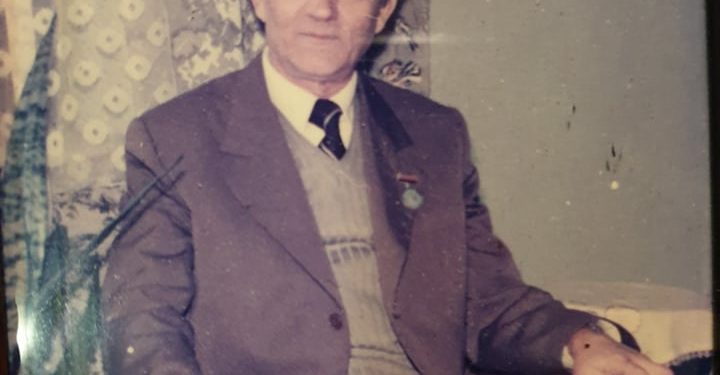
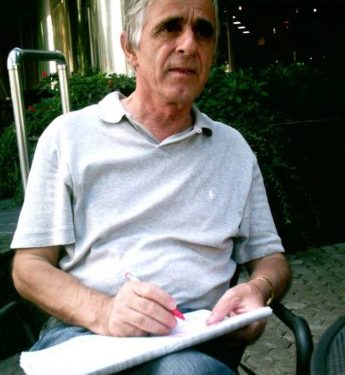
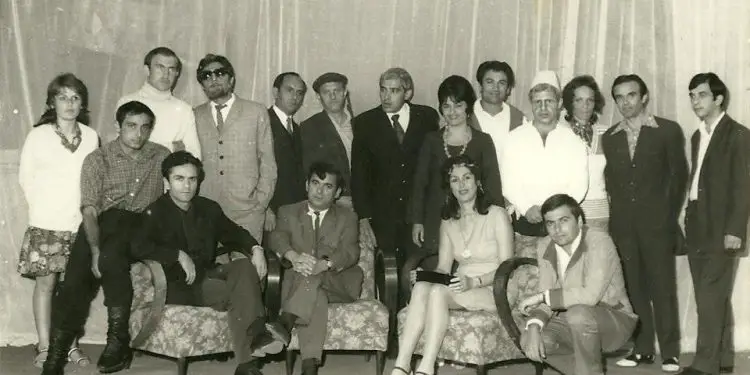

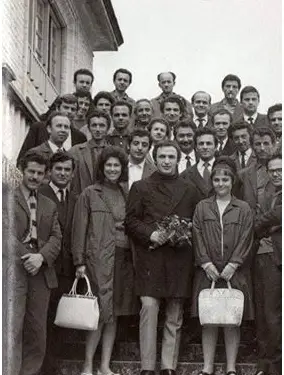
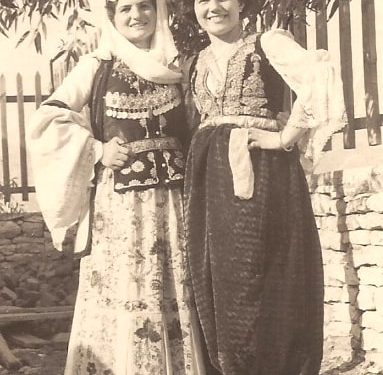

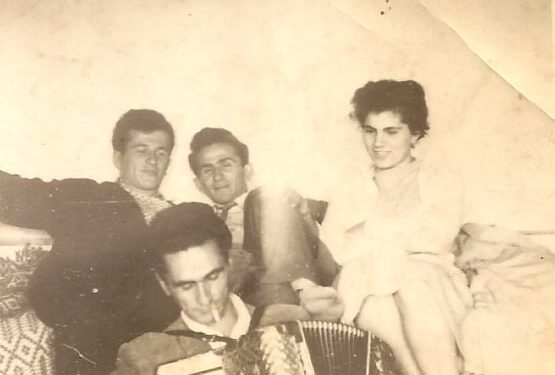


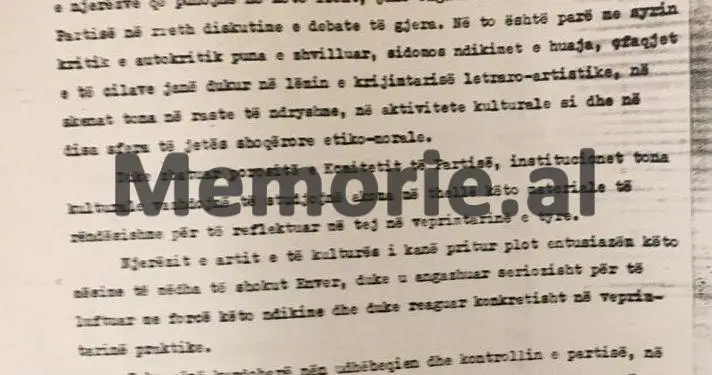
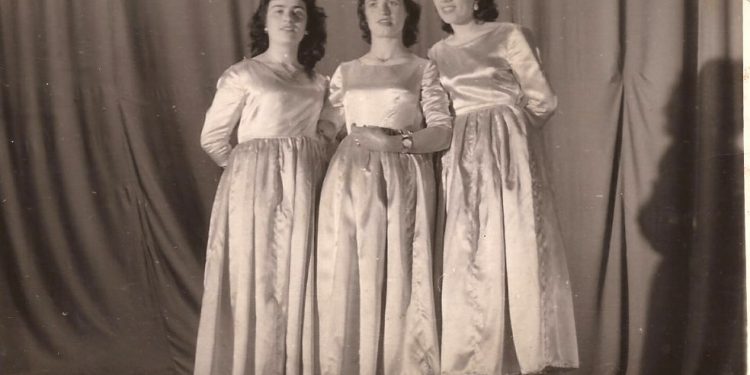
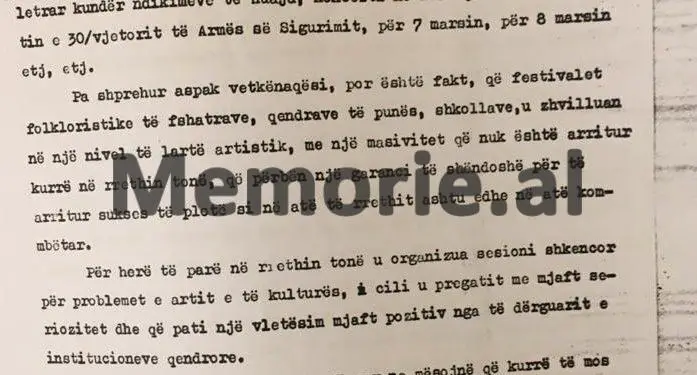
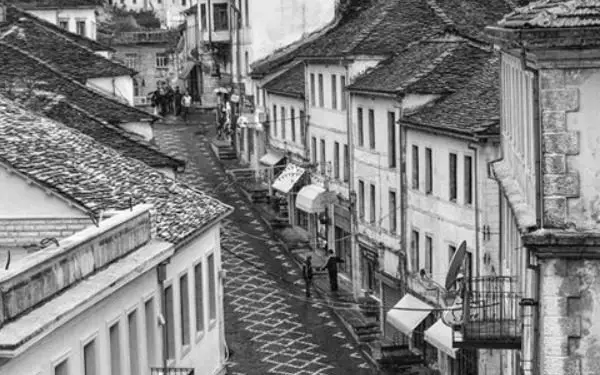
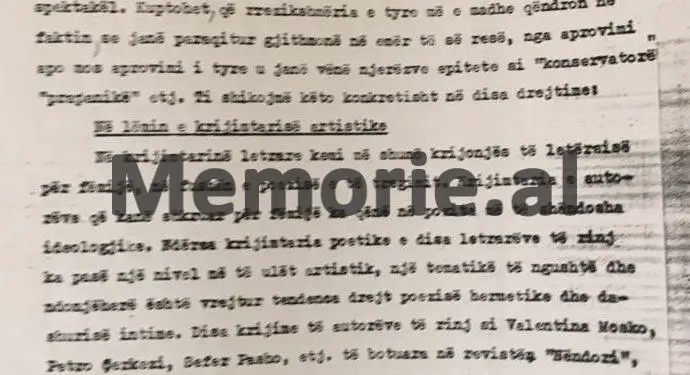
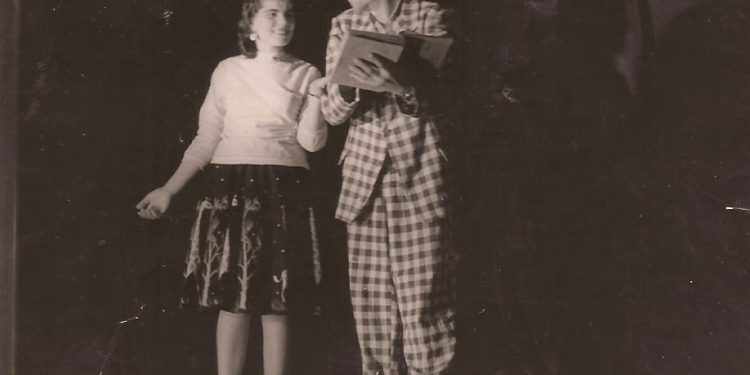
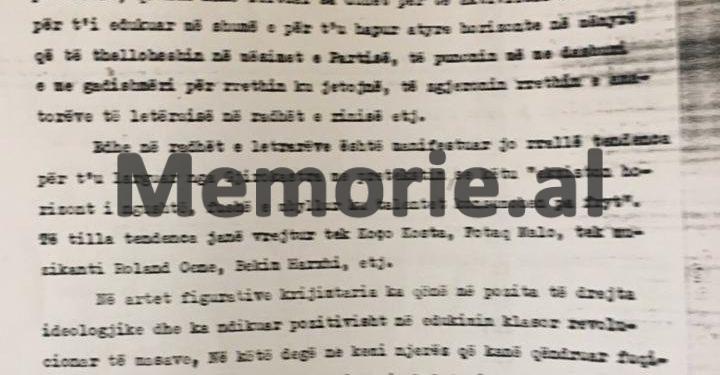
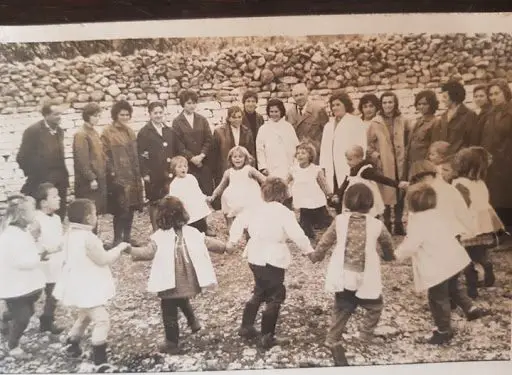
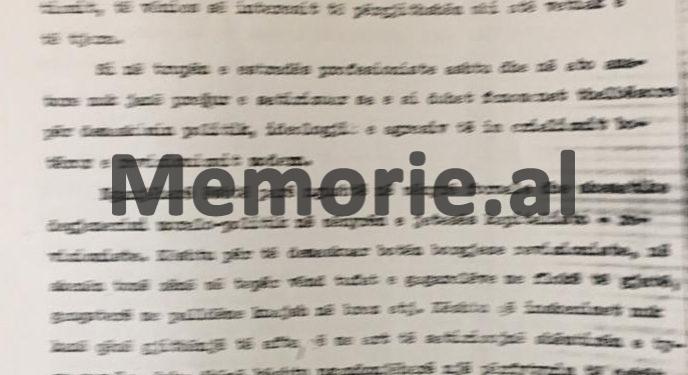
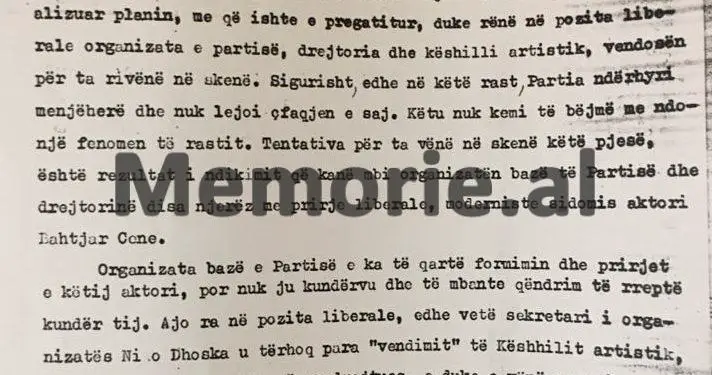



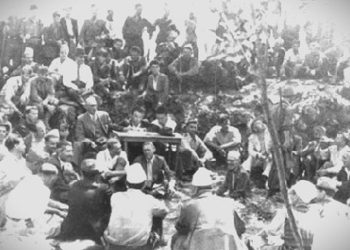
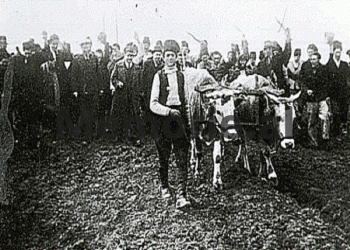
![“They have given her [the permission], but if possible, they should revoke it, as I believe it shouldn’t have been granted. I don’t know what she’s up to now…” / Enver Hoxha’s letter uncovered regarding a martyr’s mother seeking to visit Turkey.](https://memorie.al/wp-content/uploads/2026/01/Dok-1-350x250.jpg)
